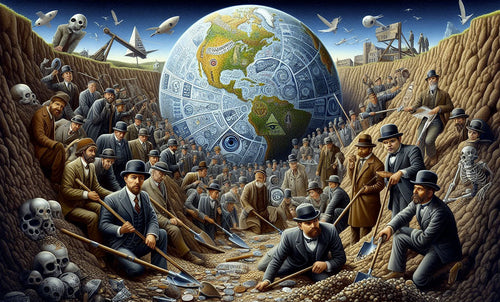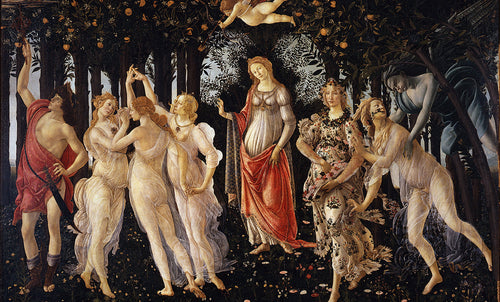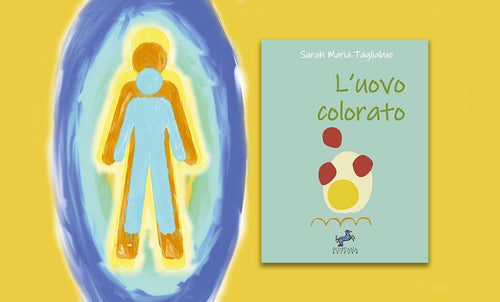
Jewish Kabbalah and the Epicurus Paradox - part 2
Fabrizio PiolaThe usual answers and the paradox of the Just Sufferer: Today we resume, after the first part published last week, this journey in which we explore together the eternal problem "What is Evil, where does it come from, why does it exist?" .
A week ago we did a “drone” survey, flying over, so to speak, the debate handed down to us by the archives of the history of philosophy, to end by anticipating what is, in summary and starting point, the vision of Jewish Kabbalah, which, as we will see, then produces a series of ethical and operational proposals. This is possible because Kabbalah is not a catechism but a Tradition, which is made up of many heads and many ideas, even more than one idea per head, which are united by a common matrix.
Today we will review, divided into homogeneous groups, the main solutions proposed by the most influential philosophers and the most widespread religions. For each one we will see why in the light of Kabbalah these solutions are unsatisfactory. We absolutely do not pretend that Kabbalah is the universal parameter of what is good and should be passed on and what can instead be thrown away. It is an objective fact that the problem of the Unde Malum is still there today, disturbing, corrosive of our apparent solutions, and - there is no point in hiding it - the main topic of a thought that more than atheist, I would prefer to describe as discouraged denial of the possibility of the existence of a Gd and of a way of resolving our difficult human condition.
First point: the problem of evil has always been the fundamental challenge to be faced by all religions. It is the benchmark of their success and spread like wildfire or the rock against which sooner or later they fall apart and sink, the unresolved worm that over time always makes its way into the fabric of a doctrine, making it more and more worn out until it becomes impalpable, and it is then that that religion withers and dies, even if as a zombie religion in appearance it continues its usual salvific routine...
The presence in the world of Pain and Suffering - concepts that in mythological, theological and philosophical terms have always been manifestations associated with Evil - is in all probability one of the fundamental reasons for the rise of religions . Religion is that doctrine, which in some way is presented as being of divine origin, which explains to us first of all the reason for evil, which places it in the general sense of Life and which consoles and supports us when we are inevitably its victims. Evil, perhaps, may even be the phenomenon that induced the same self-conscious and reflective thought of Man. The awakening of the Buddha is perhaps the most famous example of a Copernican revolution in thought caused by the shocking encounter of the then Siddharta with Evil and Pain.
To return now to the field of Judaism and Kabbalism, Franz Rosenzweig , the great Jewish philosopher of the last century, stated that in his opinion philosophy itself is born from the reality of death and the radical fear that it inspires in the living. If Judaism in itself, as we know, has not in fact said much that is original on the theme of Evil, Kabbalah, on the other hand, has been influenced in its rebirth, definable as Hispanic-Provençal “adolescence”, by reflections originating from the comparison with neo-Platonism, Aristotelianism, but also by less formalized traditions such as Hermetic and mysterious thought, filtered through the refined and then much more evolved Sufi philosophy expressed prodigiously within Islam, and this exposition has made the theme of Evil a central ideological thread, inextricably intertwined with its own Theosophy, its Theodicy and its Cosmogony. Kabbalah is aimed at the Rectification of Man and the World, at the recovery of the Light that was dispersed, Light here suffocated, encrusted as it is by the Q'liphot, which are the shell, the dross, the imprisoning forms of Evil and of the painful exile that separates us from the synthesis of all things in the One.
And these are the big questions. The more you become aware that your life will not last forever, the more and more one can not help but ask: What is really important, and what is not? What is the ultimate meaning of the experience of life? Why do we have to suffer, lose everything we love, and ultimately die?
Philosophers, Prophets, Religions, Gurus, have given us many answers and they all deserve examination and criticism. We recall that, by choice of the writer, here we examine only the answers elaborated by the Euro-Mediterranean and Near Eastern cultural tradition. Let's proceed.
THE TYPE A RESPONSE.
It is the classic, typical and consolidated one of the portion of the world that we have just indicated, in which moreover much of the knowledge elaborated by the great classical civilizations of the ancient world has flowed: Egypt, Greece and Rome. This answer reads in summary:
“Yes, there is certainly an intrinsic meaning inherent in the Universe; and yes, Man has the ability to relate to this meaning and ultimately access it.”
This reassuring statement will ultimately prove to be too abstract and will never be adequately reflected in the experience of the absolute majority of people, who have not chosen to deal with metaphysics and initiatory paths towards knowledge and awareness of the Self, and this because they are too closely tied to the perennial wheel of living, producing, consuming, dying. And in fact in all of us, however, beyond the reassurances of revealed religions and many forms of empirical spirituality, there remains a bitter pill in the throat, the one that never really goes down:
“If this is really the case, and the Universe has a meaning, then why is human life an experience completely traversed - from the cradle to the grave - by the presence of pain and suffering?”
If we also happen to be a “member” of the club of the faithful of revealed religions, then that question will clash even more with the image of that Omnipotent Divinity from which emanates every Love and blessing that we honor with dedication and hope. This clash will inevitably produce what we will call the Fundamental Primary Observation:
“Why if there is a G-d who is both Omnipotent and the primary source of Love and all Good, then this G-d then allows INNOCENT people to suffer or even succumb to the effect of the presence and action of Evil in the World?”
This observation leads religions and the like to formulate the Type B reply/response.
THE TYPE B RESPONSE / REPLY.
The classic counter-reply from the holders of revealed truths is rather blunt:
“Evil is the punishment that God allows to manifest itself and fall upon Man as a consequence and retribution for his disobedience to divine laws.”
OK. The Torah, to give an example that is burning for me, is in more than one passage peremptory and crude to the extreme: he who does not respect the Decalogue - that is, does not honor his side of the contract existing between YHVH and His People - will be struck by Gd with a rain of retributive bad luck events, or Gd will simply let every misfortune in the Universe strike him without doing anything to prevent or mitigate it. The enumeration of the typical consequences is classic: "your tongue will stick to your palate, your crops will wither and perish, your cattle will be barren and so will your wife and you will finally suffer painful losses in your family, and in the end your own life will end up leaving you, but only after a long series of miseries, torments and mourning." It is a very clear warning. But ... when Evil seems to strike an INNOCENT? ...
THE VARIANT TO ANSWER B.
But, remembering the not rare eventuality of Evil that seems to arbitrarily or casually strike one or more innocent subjects, transforming them into the paradox of the suffering Just, then we are reminded that the Torah very often specifies that the Lord in His love is jealous and possessive towards His People . This love, infinite in its depth and in its possessiveness (for those in the Kabbalistic profession, we are speaking here of the events and wills that take place at the level of the Divine Partzuf known as Zeir Anpin) leads the Divine to inflict its punishment in a general manner both in space (e.g. on all the Children of Israel because of the sins of a few, on all the inhabitants of Sodom and Gomorrah, initially despite the fact that there too live a few Righteous alongside a majority of scoundrels and dissolute people, or even on all humanity and everything that lives on earth at that time, as in the case of the Great Flood) as well as through time (e.g. the sins of the fathers fall upon the sons, and so on for a variable number of generations).
Like it or not, and whether all this is more or less or not at all comprehensible from our point of view, according to traditional readings this is the method and the rule that God wanted and imposed on the World that He created, a rule of whose existence He warned us in due advance and has also given us later in the course of history also illustrious dissuasive examples. This should be enough for us to choose obedience to the Law and fidelity to the Pact. This order of ideas that seems to preclude the possibility of a further reply is now several centuries old, if not millennia. Obviously however the replies have been there all the same, in a similar span of time. Philosophers for example have the innate problem, due to their very nature as researchers and formulators of questions, that for a true philosopher a certain solution will never be convincing, if it does not fully satisfy Reason and its need to feel that it is in accordance with the Truth that is humanly attainable.
If we just wanted to take a look at the last century, real scenarios have occurred where Evil has so dominated every dimension of life that it has obscured any possible light to make us doubt with Nietzsche if by chance Gd was not dead. The 21st century began with the collapse of the Twin Towers and with all the devastation and atrocities that followed and that continue today. If in Rwanda the machetes that cut off limbs and heads were wielded by other human beings, Tsunamis and Earthquakes are what in English are called "Acts of Gd", in which the consequences are promptly exacerbated by what man had created in the affected areas by challenging Nature for greed of profit and power.
The apparent triumph of Evil leads us to doubt. What if God were dead? Or rather, what if God had never existed? Yet the 19th century had given us a prudent suggestion when Dostoevsky, through the mouth of Raskolnikov, makes us observe:
“If God does not exist, everything is permitted.”
Well, none of us would sincerely want to live a single minute in a world like that. There are those who have experienced such a world: the Holocaust, the Killing Fields of Cambodia, the mass graves of Srebrenica. These are just a few examples. The optimists then produced Type C responses.
THE REFINED ANSWER, THE TYPE C ONE. DON’T WORRY, THERE’S A PLAN.”
For example, it can be said that Evil does not actually exist if it is considered in a truly holistic vision, that is, in what many simply call “the big picture” , that is, in a Teleological and Overall Vision of vast spatial-temporal scope that includes within itself and brings back to a rational and comprehensible sense the specific, apparently aporetic cases that we consider ethically and emotionally unacceptable at the “earthly” and experiential level of observation.
For example, a guy suddenly loses a job that he loved doing as if it were his reason for living, he is left without means for some time, but then he finds a better and more fulfilling job and maybe better paid. And he would never have found this job without the dismissal (apparent and temporary evil) because he would never have had the courage to resign. Or for bureaucratic reasons and various unforeseeable circumstances a girl misses an urgent flight that seemed an indispensable need, she believes she has lost the opportunity of a lifetime, only to later discover that the plane had a serious problem. Or maybe that it crashed. Those who tell similar anecdotes invariably conclude:
“God has a Plan for the World and for each of us”
OR (TYPE C RESPONSE, ALTERNATIVE)
“God works in mysterious ways” or “God’s purposes are unknowable, His Will is inscrutable.”
The corollary follows: “Well, God always has a Plan. Even on what has devastated you today. Stay firm in your Faith. It is not given to Man to understand the Plans of God. ” Only that someone in every time and place has preserved and preserves a healthy and legitimate essential doubt, which can be summed up like this: "but why does Someone who says He loves us first strike us and knock us down in a sudden, unexpected and incomprehensible way, does not explain Himself, does not allow questions, acts mysterious, and yet expects us to understand Him, or that we maintain faith in Him, and that we reciprocate with infinite devotion and filial love?"
The model of the world and of the Creator-Man relationship that emerges from the type C response, in its various declinations, is frankly irritating because it presupposes the uselessness of Reason, which instead, according to Kabbalah and not only Kabbalah, HaShem has provided us with in abundance. And if he has done so, it means that Reason in this world presumably has some essential use to fulfill.
In Judaism itself, the shock of the Holocaust remained for many an open wound, a scandal for reason, a dead end for faith itself. Some of us have tried to insert the providential thought of the Plan, realizing that perhaps the Shoah gave a decisive final push to that historical process and self-awareness that from the second half of the 19th century led the Jews to return to the lands of their fathers, where they were reunited with their brothers who had always remained there amidst a thousand tribulations and humiliations. The redemption for all was the rise - victorious among the ruins of a murderous war that attacked it at birth - of the State of Israel. Some of us, on the contrary, when we celebrate Pesach, the Israelite Passover, and read during the liturgy of the Last Supper the famous Four Questions of the Four Sons that all begin with "Well" (why), they add a fifth, relating to the Shoah which simply consists of a "Well?" , a why as painful as a black hole that still awaits an answer.
VARIANT D. THE IMPUDENCE OF EPICURUS.
And someone may end up concluding that it is inevitable to agree with that line of thought first formulated by Epicurus, and which has made him over the centuries a true standard-bearer of militant atheism, when with light sarcasm the Greek philosopher syllogized:
“Does God have the will to prevent evil but is unable to do so? Then He is not Omnipotent. He is capable but does not want to? Then He is Malevolent. And if He wants to prevent evil and is capable of doing so, where does all the evil we experience every day come from? And if He does not want to and is not capable of doing so, then why do we continue to call Him God?”
From the point of view of Kabbalah, this mental attitude is flawed in the handle because it places God and the elements of reality that He created on the same ontological level and then draws conclusions that start from this basic misunderstanding of what reality is, which instead for Kabbalah is wonderfully articulated in His multiple planes (the five Worlds, the 10 + 1 Sephirot). The point is that these are two begging the question. In this context and limited to this point, Kabbalah appears to be founded on the Postulate of the existence of HaShem, ha Yotzer (the Creator, He who gives Form). And Epicurus is founded on that of his Non-existence. Therefore, these are not two ABSOLUTELY LOGICAL thought systems, but only coherent with the original Postulate. The certain, empirical fact is that when one has a personal and direct experience of Evil ... well, there you have it, it will seem to us exactly what it seems to us to be: an Evil. And if someone were to tell us that we are actually experiencing a good because there is a plan, this will seem to us at best an intellectualistic provocation, disrespectful of our present and real suffering. It could be experienced as a consideration that short-circuits our sense of frustration and impotence in the face of having become a victim of Evil. It is a thought that can hinder our necessary processes of elaborating mourning and pain. In some way the thought of a possible “plan of God” can anesthetize and dull those emotions and experiences that we are living. For them, the Plan is a pathetic and cloying consolation that does not satisfy the Psyche and frustrates the Mind. Epicurus' rationalist position is a limited position and ultimately insufficient to resolve the problem, given that it stops at the satisfied aporia of having brought it to light. Paradoxically, this is a very honest position that can more easily evolve than others and lead to the Kabbalistic solution to the problem of Evil that we will talk about shortly, when concrete paths that were previously unimaginable open up before reason and hope leads us to try to move forward along them.
Fabrizio Piola
















































